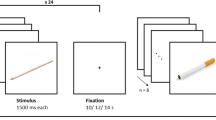Abstract
Adult, male smokers were randomly assigned to be nicotine abstinent for 12 h (n=10) or to smoke normally for the same period of time (n=10). Performance on a modified version of the Stroop (1935) color-naming task, where subjects named the color of ink in which each of a series of words was written, showed that abstinent smokers took significantly longer to color-name words related to cigarette smoking (e.g., Lighter) than to color-name neutral control words (e.g., Pennant). Non-abstinent smokers showed a significant difference in the opposite direction. These results suggest that nicotine abstinence decreases the ability to ignore the meaning of smoking-related information. This finding supports the hypothesis that abstinence produces a content-specific shift in attentional focus. The present pattern of results cannot be explained by a general decrease in cognitive function due to nicotine abstinence.
Similar content being viewed by others
References
Bentall RP, Kaney S (1989) Content specific information processing and persecutory delusions: an investigation using the emotional Stroop test. Br J Med Psychol 62:355–364
Channon S, Hayward A (1990) The effect of short-term fasting on processing of food cues in normal subjects. Int J Eating Disord 9:447–452
Channon S, Helmsley D, de Silva P (1988) Selective processing of food words in anorexia nervousa. Br J Clin Psychol 27:259–260
Foa EB, Feske U, Murdock TB, Kozak MJ, McCarthy PR (1991) Processing of threat-related information in rape victims. J Abnorm Psychol 100:156–162
Mathews A, MacLeod C (1985) Selective processing of threat cues in anxiety states. Behav Res Ther 23:563–569
Mathews A, MacLeod C (1986) Discrimination of threat cues without awareness in anxiety states. J Abnorm Psychol 95:131–138
McNally RJ, Kaspi SP, Riemann BC, Zeitlin SB (1990a) Selective processing of threat cues in post-traumatic stress disorder. J Abnorm Psychol 99:398–402
McNally RJ, Riemann BC, Kim E (1990b) Selective processing of threat cues in panic disorder. Behav Res Ther 28:407–412
Mineka S, Sutton SK (1992) Cognitive biases and the emotional disorders. Psychol Sci 3:65–69
Provost SC, Woodward R (1991) Effects of nicotine gum on repeated administration of the Stroop test. Psychopharmacology 104:536–540
Stroop JR (1935) Studies of interference in serial verbal reactions. J Exp Psychol 18:643–662
Sussman S, Horn JL, Gilewski M (1990) Cue-exposure interventions for alcohol relapse prevention: need for a memory modification component. Int J Addict 25:921–929
Thorndike EL, Lorge I (1944) The teacher's word book of 30,000 words. Bureau of Publications, Teachers College, Columbia University, New York
Tiffany ST (1990) A cognitive model of drug urges and drug-use behavior: role of automatic and nonautomatic processes. Psychol Rev 2:147–168
Warren RE (1972) Stimulus encoding and memory. J Exp Psychol 94:90–100
Wesnes K, Warburton DM (1978) Effects of cigarette smoking and nicotine tablets upon human attention. In: Thorton RE (ed) Smoking behavior: physiological and psychological influences. Churchill-Livingstone, Edinburgh, pp 131–147
Author information
Authors and Affiliations
Rights and permissions
About this article
Cite this article
Gross, T.M., Jarvik, M.E. & Rosenblatt, M.R. Nicotine abstinence produces content-specific stroop interference. Psychopharmacology 110, 333–336 (1993). https://doi.org/10.1007/BF02251289
Received:
Revised:
Issue Date:
DOI: https://doi.org/10.1007/BF02251289




